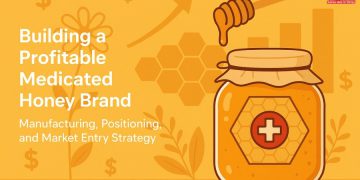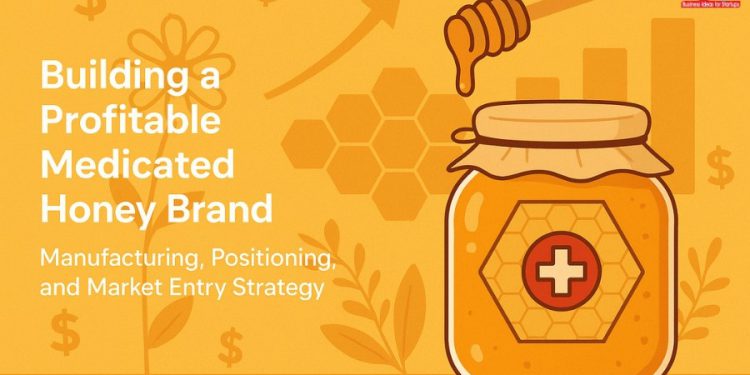With the rise of wellness markets and a focus on natural remedies, traditional honey products are now melding with contemporary consumer needs in the form of medicated honey. Customers today want more than just food products; they are looking for therapeutic, functional, and herbal products that support their health. An example is medicated honey infused with herbs. Beside other offerings, it is becoming a very popular product and is expected to grow even more in demand in domestic and international markets.
India is in the unique position of being the world leader in producing medicated honey, owing to its Ayurvedic culture, and rich honey resources. Entrepreneurs looking to ride the wellness wave will find this a lucrative business opportunity with low competition and high profit margins. This article presents details on how to launch and grow a medicated honey brand, including sourcing and processing raw materials, complying with regulations, and developing a marketing strategy. Experienced consultants like Niir Project Consultancy Services NPCS can help integrate your ideas to streamline the process and create a brand with purpose.
Market Potential for Medicinal Honey Products
Several macro trends such as immunity booster craze, including the Ayurvedic medicine system, and skepticism towards anything synthetic in the health and food industry are driving the demand for medicated honey. There is an active post covid-19 global market looking for ways simple and natural to strengthen their immunity, improve digestion, lowers inflammation, and enhances vitality.
In the Indian context, the value of honey which is already used lavishly at households increases multi-folds with infusion of tulsi, ginger, turmeric or ashwagandha. These herb ali theraputicals elevates honey from just a sweetner to a life saving product. Global hone market is expected to cross USD 15 billion within a decades time and medicated honey is one of the fastest growing subsectons in it. In India, because of rising health consciousness, the sustainably growing middle class, and renewed trust in Ayurveda, an all-rounded demand sets in both urban and rural areas.
Economic Analysis of Sourcing Raw Materials and Performing Quality Control
To ensure success for a honey brand that produces medicated honey, the ingredient sourcing must be done carefully and with uncompromised attention to quality. For the product base, the core ingredient should be unrefined honey which is preferably derived from certified apiaries or unadulterated forest regions. Businesses need to be particularly careful of the type of honey they source since their customers can be greatly health conscious, therefore their best options include wild forest honey, jamun honey, and even multifloral honey. Further, antibiotic-free honey also needs to be managed along with certificates from FSSAI, ensuring checks for moisture content, diastase activity, and other vital factors.
The subtle approach requires specific attention to be paid to the herbal constituents due to their traditional healing factors along with capability of honey and safety of the consumers. Whole herbs, extracts, or essential oils can be utilized but only under controlled hygienic conditions supported by relevant scientific or Ayurvedic documentation. Commonly used herbs include tulsi, turmeric, giloy, cardamom, and ashwagandha, but the dosage control must be precise due to nutraceutical caps. The infusion process also needs to make sure that any active compounds in the honey enzymes remain safe and undamaged.
Connected with NPCS, entrepreneurs can be guided with ease while they look to build a raw material supply chain with certified herb dealers and also be provided with relevant quality control measures based around FSSAI guidelines and AYUSH standards.
Medicated Honey Manufacturing Process
The creation of medicated honey is relatively simple as long as the active components of the honey are not damaged. The first step in the process is filtering the raw honey to get rid of the wax and any other suspended solids. This is done as handcrafting herbal extracts which are either aqueous, oil, or alcohol based, according to the solubility of the herbs, is prepared. The infusions are then blended with the honey below 40°C to avoid destruction of enzymes, which is known as gentle mixing.
After infusion, the mixture is homogenized to achieve even distribution of herbal actives. The product is ther placed into sterile jars or bottles where they will be filled, sealed, labeled, and batch coded. Before the product is packaged for distribution, the medicated honey has to go through quality control tests which check for measurments in viscosity, moisture, microbial load, and pH. In order for the facility to work, they should have food grade production standards and apply GMP (Good Manufacturing Practice) regulations to ensure safety and consistency of the products.
For entrepreneurs, NPC’s Support enables access to design options, flowcharts, and equipment tailored for specific production needs or financial needs.
Related: Why Initiating Honey Processing Business
Business Compliance and Honey Licensing
Honey, like any other food product must be regulated before any marketing activity takes place. In India, the FSSAI Authority is charged with the responsibility of managing food items. There exists two broad ways of marketing the product as ‘medicinal honey’. The first is a herbal supplement claim which would allow registration under FSSAI’s flavored or infused honey category. The other category, positioned as a health product or medicine with specific claims, requires licensing either through AYUSH or within the nutraceuticals section under FSSAI.
Dosage instructions, batch number, manufacture and expiry date, and warning (if any) need to be included in the labeling process as well as any claim made such as ‘improves immunity”, “anti-inflammatory” or “aids in digestion” alongside proof, whether traditional or clinical, with no advertising policies broken. Bordering state Exporters along with other countries need to include claim regulation checks for heavy metals, pesticide herbicides, and antibiotic contamination.
NPCS provides support services regarding documentation required for FSSAI and AYUSH licensing, compliance procedure guides for exports, and third-party testing services.
Medicinal Honey Production Unit
Medicinal honey is a form of honey with added medicinal properties and can be produced easily with nominal investment and limited facilities. The basic equipment includes filtration units, stainless steel mixing tanks, agitators, filling & capping machines, and labeling units. Depending on your production target, there can be manual, semi-automatic, or fully automated lines.
The area requirement for that type of unit is approximate 1000 to 3000 square feet. Investment for a semi automatic plant that can produce 500–1000 jars per day is estimated in range of 40 lakh to one crore with the equipment, working capital, and quality control set up. The growing demand for honey and direct to consumers models enables investment payback in two to three years.
NPCS assists guides entrepreneur in selection of machinery and vendors, plant layout, utility planning to enable effortless set up of a compliant efficient production plant.
Application of Branding Strategy & Product Positioning
The market of medicated honey supports authenticity, health value, and clarity in messaging. Therefore, the brand needs to highlight the health benefits of the ingredients and convey trust and purity as well. This includes the source of honey, the herbs, and manufacturing and third-party test results. Clear labels, eco-friendly and minimalist packaging makes a stronger connection with health-driven customers fostering credibility.
Positioning needs to change according to the target population. Stronger immunity variants “with kirimoya, giloy and tulsi” could be more appealing for the young professionals and parents; stress-relief variants “with ashwagandha and brahmi” may suit working adults; seniors could enjoy digestive honey with cinnamon or fennel.
Starting with a small but well-defined assortment like three variants targeted at digestion, immunity, and vitality can make for strong market testing and brand recognition. A broader scope over time would include sachets, travel packs, formulations for children, or luxury gift boxes.
NPCS helps provide guidance on product positioning, category benchmarking, brand story, and market research design to ensure new entrants build a compelling brand from the start.
Market Entry and Distribution Channels
Unlike medicated honey, traditional honey has a more thorough wellness product market. This includes pharmacies, health food stores, Ayurvedic clinics, yoga centers, and premium organic supermarkets. Having a strong online presence has become essential with the rise of e-commerce. Selling through dedicated websites, Amazon, Flipkart, 1mg, Bigbasket, and social media platforms such as Instagram and Youtube is vital for targeting health-conscious consumers.
Wellness focused businesses are adopting a direct-to-consumer model (D2C) where consumers subscribe for fixed monthly deliveries. This fosters enhances cash-flow and brand loyalty. Sponsorship from dieticians and Ayurvedic health coaches acting as influencers will help broaden the demographic reach and enhance credibility.
NPCS helps formulate the marketing plan and identify the ideal channels to tap into for spas, wellness resorts, or institutional B2B buyers.
Related Project: Honeycomb Paper Products (Board, Paper Partition, Pallets & 5 Ply Corrugated Boxes)
Financial Viability and ROI
The most salient financial point of interest for added value medicated honey is its appeal laid in the added-value proposition. While the wholesale market for raw honey offers ₹250-300 per kg, retail packs of medicated honey can range from ₹500-800 per 250 gm jar depending on the brand, ingredients, and market position. Financially realistic figures for gross-profit margins of well-managed brands fall between 40%-50%.
Once scaled, a plant that produces 1,000 jars a day with an average retail price of ₹300 per jar can exceed monthly revenues of ₹80 lakh. With strong market presence and brand marketing, the break-even period can be less than 24 months.
NPCS project reports provide accurate analyses of break-even analysis, cash flow, ROI mapping, and market capturing strategies including operating market-related expenses.
Conclusion: A Sweet Opportunity in Functional Wellness
Medicated honey sits at the intersection of food, health, and tradition—a trifecta that appeals to the modern consumer. There is a tremendous opportunity to build a brand for those willing to innovate and invest, particularly with infused honey products. With the growing preference for natural remedies and plant-based healing, it doesn’t matter if you’re creating niche Ayurvedic products or targeting the mass wellness market: success lies in quality and the customer’s trust.
Industry experts greatly reduce startup friction, enabling you to focus on compliance, production, and marketing with ease. Joining NPCS is one such solution.


















